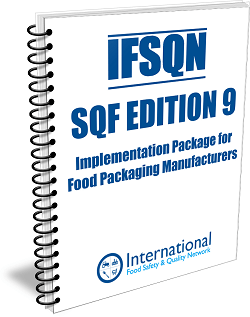- Home
- Sponsors
- Forums
- Members ˅
- Resources ˅
- Files
- FAQ ˅
- Jobs
-
Webinars ˅
- Upcoming Food Safety Fridays
- Recorded Food Safety Fridays
- Upcoming Hot Topics from Sponsors
- Recorded Hot Topics from Sponsors
- Food Safety Live 2013
- Food Safety Live 2014
- Food Safety Live 2015
- Food Safety Live 2016
- Food Safety Live 2017
- Food Safety Live 2018
- Food Safety Live 2019
- Food Safety Live 2020
- Food Safety Live 2021
- Training ˅
- Links
- Store ˅
- More
Advertisement
Featured Implementation Packages
-
SQF Implementation Package for Food Packaging Manufacturers - Edition 9
This comprehensive documentation package is available for immediate download, ca... more
-
BRCGS (& FSMA) Food Safety and Quality Management System for Food Manufacturers - Issue 9
This comprehensive yet simple Food Safety Management System Package contains EVE... more
The importance of human skills and digital systems in monitoring food safety
Aug 29 2024 08:57 AM | Simon
Food Safety Digital Monitoring Systems Food Safety Culture Employee Training Food Quality Management Human Skills in Food Safety Food Safety Technology Food Safety Best Practices Food Safety Compliance Crisis Management
Overview
Foodborne illnesses remain a significant concern despite the widespread implementation of food safety programs across the food industry. Two critical factors contributing to this trend are a poor food safety culture and inadequate employee training and development. In search of quick solutions, many food businesses are turning to digital food safety monitoring systems to reduce food contamination and ensure compliance. These technologies enable real-time monitoring of essential parameters such as temperature, pH, and moisture, along with task checklists and procedures to simplify food safety processes, saving time and effort. However, technology alone is insufficient. This article explores the crucial relationship between digital tools and human skills in safeguarding food safety, emphasising the need for comprehensive training and the powerful synergy of combining technological innovation with human expertise.
The Role of Digital Tools in Food Safety Management
Digital monitoring tools provide greater transparency, traceability, and accountability in food safety. However, achieving significant improvements requires a solid understanding and application of food safety systems and a strong food safety culture. As reliance on digital tools increases, it is essential to recognise human skills—critical thinking, problem-solving, communication, interpersonal, and leadership skills—in maintaining high food safety standards.
Although digital tools offer numerous advantages, they are not infallible alone and should not foster a false sense of security. These tools must be complemented by other monitoring approaches to ensure comprehensive safety. Technology should enhance best practices rather than merely define the minimum standards for safety. It is important to recognise that while digital tools are valuable, they cannot replace the human element in food safety. Complying with food laws sets the minimum standard, but the best food businesses strive to exceed these requirements.
For digital food safety technology to be truly effective, it must be used to enhance good practices rather than serve as a guide for the minimum necessary actions. This technology can assist in monitoring and controlling food safety hazards, but achieving optimal results requires leaders and team members to possess foundational human and technical skills. They must be able to identify and assess potential food safety hazards, understand how to reduce and control them and recognise their critical importance. Only through the synergy of advanced technology and skilled human involvement can the highest standards of food safety be maintained.
Challenges and Limitations of Digital Tools
Digital tools for food safety management offer many benefits, but they also come with several challenges and limitations:
Technical Issues:
System Failures: Malfunctions in hardware or software can interrupt monitoring and data collection, potentially compromising food safety.
Maintenance and Upkeep: Regular maintenance and updates are necessary, which can be costly and time-consuming.
Data Security Concerns:
Cybersecurity Risks: Digital systems are vulnerable to hacking, data breaches, and cyber-attacks, risking the loss or manipulation of sensitive data. Additionally, these threats pose a risk of malfunctioning key systems.
Reliability of Data:
Accuracy and Calibration: Regular calibration of sensors and tools is crucial to ensure accurate data. Inaccurate data can lead to false readings and misguided decisions.
Data Interpretation: Proper analysis and interpretation require skilled personnel. Misinterpretation can result in inadequate responses to potential hazards.
Skill Gaps: Employees may lack the necessary skills to effectively use and interpret data from digital tools, reducing their effectiveness.
Dependency on Technology:
Over-Reliance: Excessive dependence on digital tools can lead to complacency, with leaders and employees potentially neglecting manual checks and human oversight.
Human Skills for Improving Performance
Human skills often referred to as soft skills, encompass a range of abilities that enable individuals to interact effectively with others. In the context of food safety, these skills are essential for ensuring that safety procedures and practices are not only followed but also continuously improved. Key human skills and their critical importance to food safety include:
1. Leadership and Teamwork
Effective monitoring often requires collaboration across different work areas. Leadership skills help coordinate efforts, while teamwork ensures everyone works towards common food safety and business goals. Together, they significantly reduce the risk of oversights or errors.
2. True Commitment to Food Safety Culture
A genuine commitment by senior leaders and team members to food safety is essential for establishing a strong food safety culture. This involves prioritising food safety in all operations and consistently reinforcing its importance among all team members.
3. Building a Food Safety Culture
Establishing a strong food safety culture involves emphasising the importance of food safety practices to all team members and ensuring these practices are consistently followed. This culture fosters an environment where safety is prioritised at every level of operation. The article Building a food safety culture (Powell, Thomson, Jeyakumaran) provides greater insights.
Essential Human Skills for Food Safety
4. Dependability
Dependability ensures that all team members consistently follow food safety policies and procedures. Reliable workers help maintain consistent safety standards, reducing the risk of contamination and ensuring consumer safety.
5. Trust
Building trust within a team promotes a collaborative environment where team members feel confident to report issues, suggest improvements, and comply with safety practices. Trust between leadership and employees ensures open communication and adherence to food safety protocols.
6. Critical Thinking
While digital systems provide alerts and data, human judgment is necessary for critical assessment. Leaders must analyse information, identify potential risks, and make informed decisions to prevent food safety incidents. Critical thinking is crucial for verifying and validating the accuracy of data from digital systems. Attention to detail ensures that the data is accurate and reliable, and critical thinking helps assess the validity of the findings.
7. Problem-Solving
When digital systems flag potential issues, problem-solving skills are crucial for identifying the root cause and developing effective solutions. This involves understanding complex situations and making swift, accurate decisions to reduce risks.
8. Adaptability
Food business production environments are dynamic and can be unpredictable. Leaders and their teams must be adaptable, applying food safety principles effectively across various scenarios. Flexibility is essential for swift responses to new challenges and changing conditions.
As digital systems and food safety standards evolve, human adaptability ensures that teams can quickly learn and integrate new digital tools and methodologies into their monitoring processes, staying ahead of emerging risks and regulatory changes.
9. Communication and Training
Effective communication is crucial for conveying the importance of food safety practices and ensuring compliance. Operational leaders must support training opportunities for team members in food safety procedures and practices, ensuring everyone understands and follows them.
10. Continuous Improvement
While digital systems can track performance metrics and highlight areas for improvement, human initiative drives the implementation of changes. Leaders and team members play a vital role in evaluating existing practices, identifying areas for improvement implementing necessary changes and ensuring ongoing advancement in safety standards.
11. Crisis Management
In the event of a food safety incident, leaders and employees must act decisively to reduce risks and protect consumers' health. This requires quick thinking, problem-solving skills, and adherence to established protocols.
Conclusion
Combining human skills with digital monitoring systems and a strong food safety culture creates a strong framework for ensuring food safety performance. Digital systems provide the data and automation needed for efficient monitoring, while human skills bring critical thinking, problem-solving, and communication to interpret data, respond to issues and drive improvements. Investing in training and development initiatives is essential to equip Leaders and team members with the necessary skills to effectively utilise these technologies and maintain high standards of food safety. This synergy between technological innovation and human expertise ensures a comprehensive and dynamic approach to maintaining and enhancing food safety standards.
Authors
By Andrew Thomson and Dr Matthew Wilson
Andrew Thomson is the owner of Think ST Solutions, a leading provider of food safety and training solutions for the broader food service sector. With a career spanning diverse and pivotal roles, Andrew brings a wealth of expertise to the table. His background includes contributions as a writer for a food industry media outlet, roles in food regulatory and policy, quality assurance and passionate education. He has also served as a board member for a not-for-profit community food service organisation.
Dr Matthew Wilson is a senior lecturer in food and nutrition at the University of Adelaide. He has a strong background in research and supervision in food quality, preservation, and shelf life. He has extensive experience teaching at the university level and specialises in food regulations, microbiology, and food processing technologies.











0 Comments